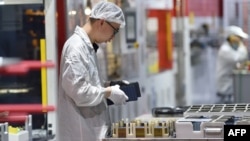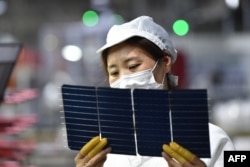U.S. Treasury Secretary Janet Yellen is on a five-day visit to China, where she expressed concern to Chinese officials Friday about state subsidies that fuel manufacturing overcapacity in industries such as electric vehicles, solar panels and semiconductors.
U.S. officials and economists have warned that China's overcapacity — when its production ability significantly exceeds what is needed in markets — will further drive down prices and cost jobs, especially if China seeks to offload excess production through exports instead of domestic consumption.
U.S. President Joe Biden, in a phone call with Chinese President Xi Jinping Tuesday, said China's "unfair" trade policies and "non-market" practices harm the interests of American workers and families.
China's Foreign Ministry spokesperson Wang Wenbin gave reporters at a regular briefing Wednesday a rundown of the conversation the two leaders had on trade, according to Beijing. He said "the U.S. has adopted a string of measures to suppress China's trade and technology development and is adding more and more Chinese entities to its sanctions lists. This is not 'de-risking,' but creating risks."
So, when is an industry at overcapacity?
Gary Clyde Hufbauer, a senior fellow at the Peterson Institute for International Economics, said that for capital-intensive industries such as steel, oil refining and semiconductors, when capacity utilization is below 75% for an extended period of time, most observers would label that excess capacity.
Hufbauer told VOA that China's massive government-stimulated and bank-financed investment has resulted in almost all the country's capital-intensive manufacturing industries having overcapacity.
"If China does pursue a massive export 'solution,' that will hurt manufacturing firms in Japan, the E.U., Korea and other industrial countries. But low prices will be welcome in many developing countries in Latin America, Africa and Asia," he said.
A report last week by the New York-based Rhodium Group, which researches the Chinese market, shows that the utilization rate of China's silicon wafer capacity dropped from 78% in 2019 to 57% in 2022. In 2022, China's lithium-ion battery production reached 1.9 times the domestic installation volume, showing that the problem of overcapacity in clean energy fields is emerging.
China's exports of electric vehicles, solar cells and lithium batteries have increased even more significantly. Data shows that in 2023, China's electric vehicle export volume was seven times that of 2019, while its solar cell export volume in 2023 was five times that of 2018, an increase of 40% from 2022.
The report notes that while temporary overcapacity may be harmless and a normal part of the market cycle, it becomes a problem when it is perpetuated by government intervention.
The Rhodium Group's report says that China's National People's Congress in March focused on industrial policies that benefit high-tech industries, while there is little financial support for household consumption.
"This policy mix will compound the growing imbalance between domestic supply and demand," says the report. "Systemic bias toward supporting producers rather than households or consumers allows Chinese firms to ramp up production despite low margins, without the fear of bankruptcy that constrains firms in market economies."
Overcapacity a decade ago
China's structural overcapacity problem is not a new phenomenon. Rhodium Group's report says the last time China had large overcapacity issues was from 2014 to 2016, a few years after the government launched a massive stimulus package in response to the global financial crisis that began in 2008. The stimulus package centered on infrastructure and real estate construction, triggering major capacity build-up in a range of associated industries.
In 2014, as the demand for real estate and infrastructure construction weakened, there was obvious overcapacity in heavy industrial products such as steel and aluminum.
"Ultimately, China's excess capacity is due to state interference in the market," said Derek Scissors, a senior fellow at the American Enterprise Institute. "Genuinely private participants can't sustain excess capacity for long because it causes losses. But state support for production of some goods and services, called "strategic" or something like that, enables companies to survive despite these losses."
Scissors said China's overcapacity in the new energy sectors of electric vehicles, solar panels and batteries concerns the Biden administration as it wants to expand those sectors in the U.S.
"The U.S. has raised concerns about Chinese overproduction for years," he told VOA. "What's changed is there is now emerging American industrial policy clashing with long-standing and widespread Chinese industrial policy."
The Rhodium Group's report says China's surge in exports of new energy products over the past few years could be devastating for market-constrained producers in advanced economies such as the U.S.
Beijing's policy planning will exacerbate the growing imbalance between domestic supply and demand, it reads, putting China on the road to trade confrontation with the rest of the world.
Adrianna Zhang contributed to this report.





